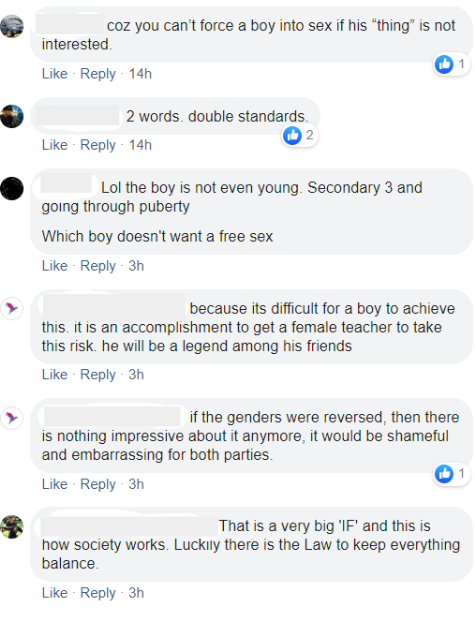“We all want this kind of teacher, don’t we?”
“I will be a proud dad if it happened to my son.”
Out of context, these statements seem innocuous enough—perhaps celebratory praise from a parent fresh out of PTM.
The truth is far from this.
On 10th June 2019, Channel News Asia (CNA) ran a report with the headline, “Female teacher who sexually exploited 15-year-old student during ‘staycation’ gets jail”. The report detailed and explained how a female teacher developed a 9 month-long relationship with a male student and engaged in sexual activity with him.
At the time of writing, the comments you just read are merely a handful of close to 600 left on CNA’s Facebook post. While some rightfully denounce the crime, an overwhelming majority flagged as ‘most relevant’ by Facebook express disturbingly inappropriate sentiments.
An abundance of admiration for the male victim dominates, with many expressing approval towards the crime that took place, making light of it and twisting the narrative to suit the commentators’ own personal fantasies.


What is really being said when commentators gratuitously congratulate and laud the male victim for his sexual conquest of a female teacher?
The very fact that such comments abound in number suggest that commentators expect little to no disagreement with their views, that abhorrent statements about underaged boys and sex are tolerated, even encouraged.

Judging by the ‘like’ count for each problematic comment, it would appear that a sizeable number of people look upon them as comedic gems or cheeky remarks that you simply react to with a ‘laughing emoji’.
You might ask what the big deal is.
Aren’t they just deliciously witty and rambunctiously inappropriate? How wrong can they be?

Generally, toxic masculinity refers to cultural norms and expectations associated with men that cause harm to both them and society. It’s when boys have been socialised to normalise misogyny, homophobia, and violence in their everyday lives and interactions with others—all in a bid to appear more ‘masculine’.
It’s the alpha male stereotype that makes domineering, abusive fathers and husbands out of men. It’s the encouragement of men to repress their feelings instead of practising healthy methods of externalising their feelings.
More importantly, toxic masculinity wears the guise of casual commentary and harmless comedy, ignoring completely any concept of sexual boundaries.
To this end, the socialisation of males has become so tightly associated with sexual expression that many conflate the two: to be a man is to chase after sex and desire it no matter the circumstance. The measure of man’s worth is equated to his ability to have sex, and society tells men they must seek sex to validate their masculinity.
Nevermind that these comments seem to flippantly dismiss the age of consent. Nevermind that contrary to what the comments have vividly imagined, the male victim might not have wanted the relationship or enjoyed it.
But this is precisely why all of this is so dangerous.
The age of consent in Singapore is 16 for all sexual activity encompassing all genders and sexualities, and for good reason.
Sexual activity involves risks and complications that require appropriate understanding before safe participation. Maturity and long-term perspectives are essential prerequisites for this process. Having unprotected sex without knowing the sexual health status of your partner is a choice that’s entirely fine to make—provided you’re aware of the possible consequences, ie. contracting HIV and other STDs, the possibility of pregnancy.
If you’ve read through the CNA report, there were photos and even a video of the male victim and female perpetrator. It’s never stated if the male victim was aware of the female perpetrators sexual history or other considerations. We are never told if they engaged in unprotected sex.
It’s already tenuous to assume all adults have the necessary maturity and long-term perspective to understand the risks behind the choices they make with regards to sex. And given Singapore’s fixation on abstinence as the main form of protection in what little sex education students are given, it’s doubtful the 15-year-old victim understood the importance of using protection.
What if he had gotten her pregnant? What if he had been infected with an STD that the female perpetrator had contracted from someone else? Was the male victim fully aware of the possible implications of these decisions or did the female perpetrator make these decisions for him? We may never know.
It’s doubtful that being considered a “legend among his friends” or having fulfilled “every teenaged guy’s wet dream” is worth the risk of unwanted pregnancies or contracting STDs.
The lack of Romeo-and-Juliet laws in Singapore further reinforce how seriously we ought to take the age of consent when it comes to discourse about participating in sexual activity.
Equating masculinity with sexual conquests encourages men to treat women as ego-validating sex objects instead of human beings. In this case, they even signal that it’s okay for boys and young men to pursue sex before they even fully understand it.

Somehow, committing a sexual crime transforms a woman into a public effigy for sexual fantasies to be projected onto, even though this would be unthinkable if the genders were reversed.

Only that when a male has sex with a lusty authority figure—the ‘slut’—it becomes a normalised sexual fantasy; one that is exciting and transgressive. But when the situation is reversed, we are often still inclined to blame the female victim for ‘asking for it’.
It is a double standard that shows very clearly how toxic masculinity and misogyny go hand in hand. They feed off each other.

It is also a matter of ensuring the safety of victims—many of whom are often ignorant or powerless.
It’s time we knock it off with the crass comments, and recognise male sexual abuse for what it is.
Just because we don’t hear enough about stories from male victims doesn’t mean that they always enjoy it when it happens to them.
–
The Sexual Assault Care Centre can be reached at 6779-0282 and sacc@aware.org.sg from Mondays to Fridays, 10am to 10pm.
When is a sexual fantasy appropriate and when is it not? Tell us at community@ricemedia.co.






